Orchestral and Chamber Music Scores
- p.1 (Ad - Be)
- p.2 (Be - Bo)
- p.3 (Bo - Co)
- p.4 (Co - Gr)
- p.5 (Gr - Ha)
- p.6 (Ha - Ma)
- p.7 (Ma - Mo)
- p.8 (Mo - Pe)
- p.9 (Pi - Sc)
- p.10 (Sc - St)
- p.11 (St - Ze)
- Next >
-
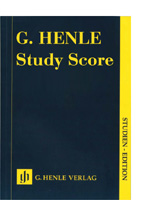
-
Schubert, Franz
Piano Trios [study score]
Study score. Includes:
• Adagio E flat major op. post. 148 D 897
• Sonata movement B flat major D 28
• Trio B flat major op. 99 D 898
• Trio E flat major op. 100 D 929
Category: Chamber Music Study Scores
Item: 028038
Grade:
Price: $17.95
Availability: Ships in 6 to 9 Days - View Shopping Cart
-
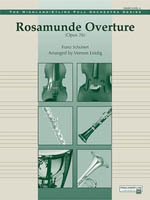
-
Schubert, Franz
Rosamunde Overture, op 26 - full score (Leidig)
Category: Orchestra Full Scores
Item: 136758
Grade: Grade 4 - Intermediate
Price: $7.00
Availability: Ships in 10 to 15 Days - View Shopping Cart
-
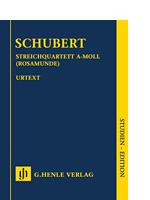
-
Schubert, Franz
String Quartet in Am, op 29. / D.804 - Rosamunde (Voss) [study score]
Romantic. The quartet in A minor is one of the chamber music works with which Schubert wanted to "pave the way to the great symphony" in spring 1824. At the same time he was paving his way to a wider audience, as the "Rosamunde" quartet was the first andonly string quartet that was not only publicly performed in Schubert's lifetime but also published in parts. It is fortunate for us that this was the case because the autograph of this much-loved quartet is missing today and the only source for th...
Read More
Category: Chamber Music Study Scores
Item: 119539
Grade:
Price: $12.95
Availability: Ships in 10 to 15 Days - View Shopping Cart
-

-
Schubert, Franz
String Quartet in Dm, D.810 - Death and the Maiden (Freienstein) [study score]
Study score.
Category: Chamber Music Study Scores
Item: 029013
Grade:
Price: $12.95
Availability: Ships in 6 to 9 Days - View Shopping Cart
-

-
Schubert, Franz
String Quartet in G, op ph 161 / D.887 (Voss) [study score]
Romantic. Schubert's String Quartet in G Major was written in 1826, but never published or performed in public during the composer's lifetime. This Urtext edition is based on the surviving autograph. Study score. For a complete set of parts, see item 86085.
Category: Chamber Music Study Scores
Item: 086086
Grade:
Price: $15.95
Availability: Usually Ships in 24 Hours - View Shopping Cart
-
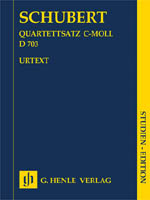
-
Schubert, Franz
String Quartet Movement (Quartettsatz) in Cm, D.703 - study score
Category: Chamber Music Study Scores
Item: 132348
Grade:
Price: $9.95
Availability: Usually Ships in 24 Hours - View Shopping Cart
-

-
Schubert, Franz
String Quintet in C, D.956 (op.post 163) (Voss) [2120 - study score]
Study score. For 2 violins, viola & 2 celli. Score only. For a matching set of parts, see item 65953.
Category: Chamber Music Study Scores
Item: 065954
Grade:
Price: $21.95
Availability: Ships in 6 to 9 Days - View Shopping Cart
-

-
Schubert, Franz
Symphonies Nrs 4, 5, 8 & 9 [Dover full score]
Category: Orchestra Full Scores
Item: 009447
Grade:
Price: $20.95
Availability: Usually Ships in 24 Hours - View Shopping Cart
-
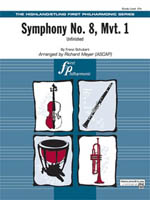
-
Schubert, Franz
Symphony No 2, movement 1 - full score (Meyer)
Category: Orchestra Full Scores
Item: 136704
Grade: Grade 3 - Early Intermediate
Price: $9.00
Availability: Ships in 10 to 15 Days - View Shopping Cart
-

-
Schubert, Franz
Trout Quintet D.667 & String Quintet D.956 [study score]
Category: Chamber Music Study Scores
Item: 033493
Grade:
Price: $3.95
Availability: Ships in 6 to 9 Days - View Shopping Cart
-

-
Schumann, Robert
Chamber Music [full score]
Category: Chamber Music Full Scores
Item: 020818
Grade:
Price: $22.95
Availability: Ships in 6 to 9 Days - View Shopping Cart
-

-
Schumann, Robert
Colloquies (3) for French Horn & Orchestra [score only]
Movements entitled: Rumination; Renewal; Remembrance. Commissioned by The New york Philharmonic. Duration: 24:00 minutes. Full score only.
Category: Orchestra Full Scores
Item: 008111
Grade:
Price: $22.00
Availability: Usually Ships in 24 Hours - View Shopping Cart
-

-
Schumann, Robert
Complete Piano Works, v.1 (Herrtrich et al) [study score]
Romantic. On the 200th anniversary of Robert Schumann's birth, an ambitious project is coming to a close: For the first time since Clara Schumann's Complete Edition of 1879-93, all of the works for piano solo are appearing as one editorial project. Spanning almost ten years of painstaking work, all of the Schumann titles published by G. Henle Publishers have undergone a careful revision. The Schumann expert Ernst Herttrich has closely examined each edition and also dedicated himself to those work...
Read More
Category: Chamber Music Study Scores
Item: 082117
Grade:
Price: $31.95
Availability: Ships in 6 to 9 Days - View Shopping Cart
-

-
Schumann, Robert
Complete Piano Works, v.2 (Herrtrich et al) [study score]
Romantic. On the 200th anniversary of Robert Schumann's birth, an ambitious project is coming to a close: For the first time since Clara Schumann's Complete Edition of 1879-93, all of the works for piano solo are appearing as one editorial project. Spanning almost ten years of painstaking work, all of the Schumann titles published by G. Henle Publishers have undergone a careful revision. The Schumann expert Ernst Herttrich has closely examined each edition and also dedicated himself to those work...
Read More
Category: Chamber Music Study Scores
Item: 082118
Grade:
Price: $31.95
Availability: Ships in 6 to 9 Days - View Shopping Cart
-

-
Schumann, Robert
Complete Piano Works, v.3 (Herrtrich et al) [study score]
Romantic. On the 200th anniversary of Robert Schumann's birth, an ambitious project is coming to a close: For the first time since Clara Schumann's Complete Edition of 1879-93, all of the works for piano solo are appearing as one editorial project. Spanning almost ten years of painstaking work, all of the Schumann titles published by G. Henle Publishers have undergone a careful revision. The Schumann expert Ernst Herttrich has closely examined each edition and also dedicated himself to those work...
Read More
Category: Chamber Music Study Scores
Item: 082119
Grade:
Price: $36.95
Availability: Ships in 6 to 9 Days - View Shopping Cart
-

-
Schumann, Robert
Complete Piano Works, v.4 (Herrtrich et al) [study score]
Romantic. On the 200th anniversary of Robert Schumann's birth, an ambitious project is coming to a close: For the first time since Clara Schumann's Complete Edition of 1879-93, all of the works for piano solo are appearing as one editorial project. Spanning almost ten years of painstaking work, all of the Schumann titles published by G. Henle Publishers have undergone a careful revision. The Schumann expert Ernst Herttrich has closely examined each edition and also dedicated himself to those work...
Read More
Category: Chamber Music Study Scores
Item: 082120
Grade:
Price: $36.95
Availability: Ships in 6 to 9 Days - View Shopping Cart
-

-
Schumann, Robert
Complete Piano Works, v.5 (Herrtrich et al) [study score]
Romantic. On the 200th anniversary of Robert Schumann's birth, an ambitious project is coming to a close: For the first time since Clara Schumann's Complete Edition of 1879-93, all of the works for piano solo are appearing as one editorial project. Spanning almost ten years of painstaking work, all of the Schumann titles published by G. Henle Publishers have undergone a careful revision. The Schumann expert Ernst Herttrich has closely examined each edition and also dedicated himself to those work...
Read More
Category: Chamber Music Study Scores
Item: 082121
Grade:
Price: $31.95
Availability: Ships in 6 to 9 Days - View Shopping Cart
-

-
Schumann, Robert
Complete Piano Works, v.6 (Herrtrich et al) [study score]
Romantic. On the 200th anniversary of Robert Schumann's birth, an ambitious project is coming to a close: For the first time since Clara Schumann's Complete Edition of 1879-93, all of the works for piano solo are appearing as one editorial project. Spanning almost ten years of painstaking work, all of the Schumann titles published by G. Henle Publishers have undergone a careful revision. The Schumann expert Ernst Herttrich has closely examined each edition and also dedicated himself to those work...
Read More
Category: Chamber Music Study Scores
Item: 082122
Grade:
Price: $31.95
Availability: Ships in 6 to 9 Days - View Shopping Cart
-
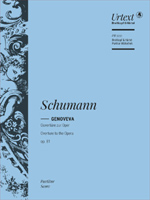
-
Schumann, Robert
Genoveva Overture, op 81 (Riedel) [study score]
Robert Schumann placed great importance on the genre of the "overture", as can be seen in the chronology of the genesis of his sole opera Genoveva. In his "Haushaltbuch" the composer entered as his first idea "thoughts of an overture", then produced the score even before having begun working on the actual opera. Schumann was right on the mark when he suspected that "the overture alone should enjoy a favorable reception". The Overture appeared in print at about the same time that the opera was pre...
Read More
Category: Orchestra Study Scores
Item: 130431
Grade:
Price: $20.95
Availability: Usually Ships in 24 Hours - View Shopping Cart
-
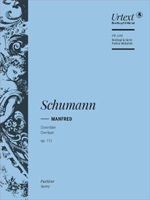
-
Schumann, Robert
Manfred Overture, op 115 (Riedel) [study score]
Schumann had already worked on Byron's Manfred as a law student, and the topic fascinated him from that time on. Perhaps he discovered a spiritual affinity to himself in the romantic hero's inner conflict? In any event, he decided on a stage rendition ofthe drama with incidental music, an entirely new genre that he had been dreaming of for some time already. He conducted the overture - it dates from 1848 - for the first time as a separate piece in March 1852. In addition, he followed the preparat...
Read More
Category: Orchestra Study Scores
Item: 130430
Grade:
Price: $22.95
Availability: Usually Ships in 24 Hours - View Shopping Cart
-
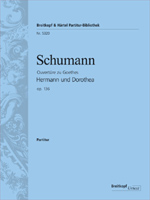
-
Schumann, Robert
Overture to Hermann & Dorothea, op 136 (Riedel) [study score]
The Overture to Hermann and Dorothea is the only compositional result that Schumann reaped from Goethes epic poem. He had originally planned an entire opera, then a Singspiel, and finally an oratorio. In the end (1851), he quickly produced an orchestral score that remained unprinted during his lifetime. The striking thematic use of the Marseillaise is multiply motivated: Goethes poem unfolds in 1796, when the two eponymous lovers are fleeing from the French revolutionary troops; Schumann had dire...
Read More
Category: Orchestra Study Scores
Item: 130428
Grade:
Price: $19.95
Availability: Usually Ships in 24 Hours - View Shopping Cart
-
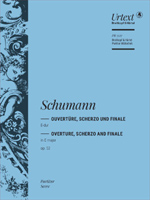
-
Schumann, Robert
Overture, Scherzo & Finale in E, op 52 (Jost) [study score]
That Schumann truly dug his heels into symphonic creation becomes clear at the latest when we look not only at his four well-known symphonies, but also at the works between the genres, such as the Overture, Scherzo and Finale. Unlike the traditional symphonic form, this work has no slow movement. Schumann spoke of it as a suite which hints at a loose connection of movements and as a sinfonietta. Ultimately, he decided to name it after the headings of the three movements which also share common tr...
Read More
Category: Orchestra Study Scores
Item: 130429
Grade:
Price: $24.95
Availability: Ships in 10 to 15 Days - View Shopping Cart
-

-
Schumann, Robert
Piano Quartet in Eb, op 47 [study score]
Eulenburg study score for the Schumann Piano Quartet, Op. 47 in E-flat major.
Category: Chamber Music Study Scores
Item: 100284
Grade:
Price: $17.99
Availability: Ships in 6 to 9 Days - View Shopping Cart
-
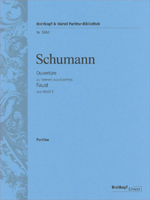
-
Schumann, Robert
Scenes from Goethe's Faust, WoO 3 (Riedel) [study score]
The question "Why add music to such perfect poetry?" preoccupied Schumann long and intensively. His first compositional approach to Goethes "Faust" began in 1844, but it was not until 1851 that he finally completed the Scenes. At Liszts suggestion, Schumann added an overture in 1853, a symphonic "instrumental introduction" which atmospherically evokes the action of the Scenes but has no direct thematic reference to them. As an independent overture, the work has been played relatively rarely in co...
Read More
Category: Orchestra Study Scores
Item: 130432
Grade:
Price: $15.95
Availability: Usually Ships in 24 Hours - View Shopping Cart
-
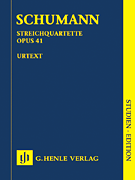
-
Schumann, Robert
String Quartets, op 41 (Herttrich) [study score]
Includes all three quartets in opus 41 - No 1 in Am, No 2 in F and No 3 in A.
Category: Chamber Music Study Scores
Item: 104297
Grade: Advanced
Price: $33.95
Availability: Usually Ships in 24 Hours - View Shopping Cart
-
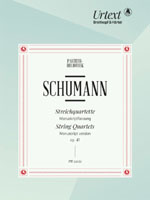
-
Schumann, Robert
String Quartets, op 41, nos 1-3 - manuscript version (Pfefferkorn) [study score]
Schumann's close collaboration with the David quartet, together with the valuable advice of his friend Mendelssohn Bartholdy, led the composer to make extensive changes to the Streichquartette op. 41 before publication in December 1842. The present edition is hence to be thought of as a critical Urtext edition; it offers in fact to those interested, an invaluable glimpse into Schumann's creative process and his striving for the final form of his string quartets. All the deletions, changes, and th...
Read More
Category: Chamber Music Study Scores
Item: 119018
Grade:
Price: $27.95
Availability: Usually Ships in 24 Hours - View Shopping Cart
-

-
Serocki, Kazimierz
Concerto for Trombone
Category: Orchestra Full Scores
Item: 025134
Grade:
Price: $69.00
Availability: Ships in 6 to 9 Days - View Shopping Cart
-

-
Shostakovich, Dmitri
Symphony No 1 in Fm, op 10 [New Collected Works Ed.]
New Collected Works edition, published by DSCH (official Russian edition authorized by the Shostakowich estate). Cloth/hard cover. Volume 1 includes Symphony No 1. Full score only - parts not included.
Category: Orchestra Full Scores
Item: 045851
Grade:
Price: $80.95
Availability: Usually Ships in 24 Hours - View Shopping Cart
-

-
Shostakovich, Dmitri
Symphony No 5, op 47 [study score]
Category: Orchestra Study Scores
Item: 082426
Grade:
Price: $32.00
Availability: Ships in 6 to 9 Days - View Shopping Cart
-
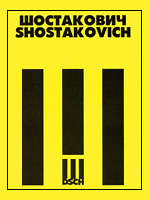
-
Shostakovich, Dmitri
Symphony No 11, op 103
Category: Orchestra Study Scores
Item: 057281
Grade:
Price: $46.00
Availability: Usually Ships in 24 Hours - View Shopping Cart
-
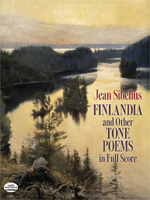
-
Sibelius, Jean
Finlandia & Other Tone Poems [Dover full score]
Masterly compositions reveal the Finnish composer's great gifts for thematic development and formal structure, as well as his ability to infuse his music with strong, tightly reined emotion. Reproduced directly from authoritative German editions. Table of contents. List of instruments. Reprint of the Breitkopf & Hrtel, Leipzig; Schlesinger, Berlin; and State Music Publishers, Moscow, editions. Full orchestral scores of: • Finlandia • Valse Triste • The Swan of...
Read More
Category: Orchestra Full Scores
Item: 009263
Grade:
Price: $26.95
Availability: Usually Ships in 24 Hours - View Shopping Cart
-
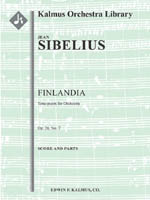
-
Sibelius, Jean
FInlandia, op 26, no 7 - full score
Category: Orchestra Full Scores
Item: 136833
Grade: Grade 5 - Early Advanced
Price: $20.00
Availability: Ships in 10 to 15 Days - View Shopping Cart
-

-
Smetana, Bedrich
Bartered Bride (Prodana nevesta) - fascmilie (Tarkmann) [full score]
2 oboes, 2 Bb clarinets, 2 horns in F, 2 bassoons, optional contrabassoon or double bass.
Category: Chamber Music Full Scores
Item: 093574
Grade:
Price: $56.95
Availability: Ships in 10 to 15 Days - View Shopping Cart
-

-
Smetana, Bedrich
String Quartet No 1 in Em - From My Life (Pospisil) [study score]
Romantic. For a matching set of performance parts, see item 87306.
Category: Chamber Music Study Scores
Item: 087307
Grade:
Price: $20.95
Availability: Ships in 6 to 9 Days - View Shopping Cart
-

-
Smetana, Bedrich
String Quartets Nrs 1 & 2 [full score]
Category: Chamber Music Full Scores
Item: 029716
Grade:
Price: $8.95
Availability: Ships in 6 to 9 Days - View Shopping Cart
-

-
Smith, Robert W.
American Portrait No.1 (Lake Township, Ohio) - full score
Category: Orchestra Full Scores
Item: 136759
Grade: Grade 4 - Intermediate
Price: $9.00
Availability: Ships in 10 to 15 Days - View Shopping Cart
-
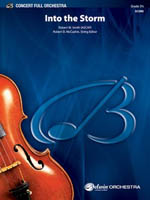
-
Smith, Robert W.
Into the Storm - full score
Category: Orchestra Full Scores
Item: 136835
Grade: Grade 5 - Early Advanced
Price: $9.00
Availability: Ships in 10 to 15 Days - View Shopping Cart
-

-
Spohr, Louis
Concerto for Clarinet & Orchestra No 1 in Cm
Category: Orchestra Study Scores
Item: 134596
Grade: Advanced
Price: $16.95
Availability: Ships in 10 to 15 Days - View Shopping Cart
-
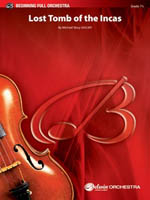
-
Story, Michael
Lost Tomb of the Incas - full score
Category: Orchestra Full Scores
Item: 136679
Grade: Grade 2 - Late Elementary
Price: $9.00
Availability: Ships in 10 to 15 Days - View Shopping Cart
-
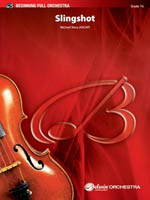
-
Story, Michael
Slingshot - full score
Category: Orchestra Full Scores
Item: 136677
Grade: Grade 2 - Late Elementary
Price: $9.00
Availability: Ships in 10 to 15 Days - View Shopping Cart
-
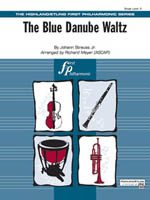
-
Strauss, Jr., Johann
Blue Danube Waltz - full score (Meyer)
Category: Orchestra Full Scores
Item: 136687
Grade: Grade 2 - Late Elementary
Price: $10.00
Availability: Ships in 10 to 15 Days - View Shopping Cart
-
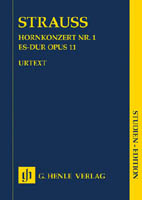
-
Strauss, Richard
Concerto No 1 in Eb, op 11 (Damm)
With his first horn concerto, the merely eighteen-year-old Richard Strauss succeeded in producing a captivating masterstroke. To this day, the concerto is beloved throughout the world (not only) by horn players, and together with Mozarts masterworks numbers among the essential pieces in the instrument's repertoire. Peter Damm, former principal horn for the Staatskapelle Dresden and world-class soloist, has not only performed the concerto publicly over 170 times himself, but has also presented piv...
Read More
Category: Orchestra Study Scores
Item: 128687
Grade:
Price: $21.95
Availability: Usually Ships in 24 Hours - View Shopping Cart
-

-
Strauss, Richard
Metamorphosen (Leopold) [study score]
Realisation for String Septet.
Category: Chamber Music Study Scores
Item: 082150
Grade:
Price: $24.95
Availability: Ships in 6 to 9 Days - View Shopping Cart
-

-
Strauss, Richard
Serenade in Eb for 13 Winds, op 7 - full score (Fennell) [2,2,2,2+1 - 4]
Category: Chamber Music Study Scores
Item: 075462
Grade:
Price: $12.00
Availability: Ships in 10 to 15 Days - View Shopping Cart
-

-
Strauss, Richard
Serenade in Eb for 13 Winds, op 7 - study score (Gertsch) [2,2,2,2+1 - 4]
When he was a mere 18 years old, Richard Strauss composed the highly Romantic, one-movement Serenade for Wind Instruments, op. 7. Extremely popular among wind players to this day, this work recalls in instrumentation and structure Mozart's "Gran Partita," which certainly served as a model for Strauss. The serenade was not premiered in its Bavarian homeland as might have been expected, but rather in Dresden, in 1882, under the direction of the then much-esteemed conductor Franz Wllner, who had al...
Read More
Category: Chamber Music Study Scores
Item: 130000
Grade:
Price: $32.95
Availability: Ships in 10 to 15 Days - View Shopping Cart
-

-
Strauss, Richard
Serenade in Eb for 13 Winds, op 7 - study score [2,2,2,2+1 - 4]
Category: Chamber Music Study Scores
Item: 101441
Grade:
Price: $22.95
Availability: Ships in 6 to 9 Days - View Shopping Cart
-

-
Strauss, Richard
String Sextet, from Capriccio, op 85 - score
Category: Chamber Music Full Scores
Item: 131144
Grade:
Price: $15.99
Availability: Ships in 10 to 15 Days - View Shopping Cart
-

-
Stravinsky, Igor
Agon [study score]
Ballet for eight dancers. Study score. Hawkes pocket score.
Category: Chamber Music Study Scores
Item: 058815
Grade:
Price: $43.00
Availability: Ships in 6 to 9 Days - View Shopping Cart
-
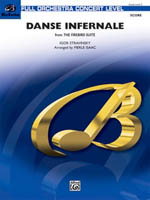
-
Stravinsky, Igor
Danse Infernale, from Firebird - full score (Isaac)
Category: Orchestra Full Scores
Item: 136837
Grade: Grade 5 - Early Advanced
Price: $10.00
Availability: Ships in 10 to 15 Days - View Shopping Cart
-

-
Stravinsky, Igor
Firebird Suite [1919] (McAlister/Nieweg)
Category: Orchestra Full Scores
Item: 125657
Grade:
Price: $80.00
Availability: Ships in 10 to 15 Days - View Shopping Cart
- p.1 (Ad - Be)
- p.2 (Be - Bo)
- p.3 (Bo - Co)
- p.4 (Co - Gr)
- p.5 (Gr - Ha)
- p.6 (Ha - Ma)
- p.7 (Ma - Mo)
- p.8 (Mo - Pe)
- p.9 (Pi - Sc)
- p.10 (Sc - St)
- p.11 (St - Ze)
- Next >
More Options
- Use our Custom Order Page to special order items you can't find.
- Use our Catalog Order Page to order items from a printed catalog, or if you already know our catalog number for the item(s) you're interested in.
- And as always, feel free to E-mail us with your questions!
